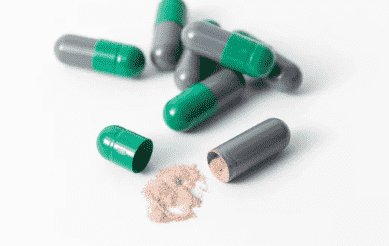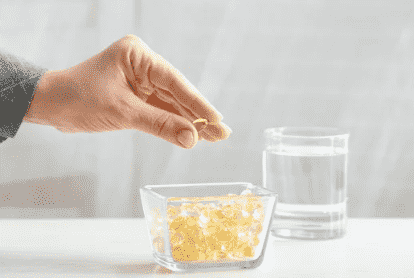Gelatin is a natural substance derived from collagen which is always found in animal bones and skin. Gelatin can be well absorbed and metabolized by the human body. It does not cause rejection or toxicity either. Moreover, gelatin has good solubility and safety. Because of these qualities, it is widely used in making capsules.
Gelatin capsules are a dosage form to hold medicines for different uses. The capsule shells could be hard or soft. If you are working for pharmaceutical or nutraceutical industries, it is vital to know their differences. It helps you choose the right type for your business.
What Is a Hard Gelatin Capsule?

Hard gelatin capsules are designed to hold solid ingredients, such as powders, granules, etc. Hard gelatin capsules are usually composed of gelatin, water and plasticizers. The water keeps the gelatin flexible. And its moisture content usually ranging between 13% to 16%. Plasticizers are added to make the hard gelatin capsule less brittle. Common plasticizers include glycerin or sorbitol. And there are many capsule sizes available.
Hard gel capsules are two-piece design. They have two parts: the body and the cap. The body holds the medication, and the cap covers it. They fit together snugly but can be pulled apart if needed.
What Are Softgels?

Do you know what is a softgel? Soft gelatin capsules are single-piece capsules without clear separations. They can be transparent or semi-transparent. It allows visibility of the liquid or oily substances inside. These soft gelatin capsules are excellent for enclosing oils, solutions, and suspensions. This makes them ideal for delivering medications and supplements in liquid form. A common example of softgels in the market is fish oil.
Similar to hard gelatin capsules, softgels also contain water and plasticizers. In addition to these, soft gelatin capsules require extra preservatives. This increases the risk of microbial growth. Because it features a higher moisture content and plasticizers than hard gelatin capsules. Therefore, preservatives are added to prevent the soft gelatin capsules from spoiling. Common preservatives include potassium sorbate or methylparaben.
Three Differences Between Hard Gelatin and Soft Gelatin Capsules
These two dosage forms are both easy to swallow. And they support to customize shapes, such as ovals and rounds, for more attraction. But you should know some key differences between hard gelatin and soft gelatin capsules.
Hard Gelatin vs Soft Gelatin Capsules: Different Manufacturing Process
When making hard gelatin capsules, it needs to prepare a gelatin mixture. It is always made of water and additives. This mixture is used to form two-piece capsule shells through molds. After preparing hard gelatin capsules, the filling process can start.
In this stage, a capsule filling machine is a must. You can choose automatic or semi automatic capsule fillers. Both of them complete a high quality capsule filling process. They also support precision filling of powdered medications or supplements. The ingredients will be filled into the capsule bodies at first. Then they are sealed with the capsule caps to prevent leakage.
You can check the video to see the making process.
Compared to hard gelatin capsules, soft gelatin capsules has a more complex manufacturing process. Soft gelatin capsules should be produced through a multi-step process. It also begins with preparing a gelatin solution. The solution always includes water and plasticizers like glycerin. This viscous solution is used in a softgel encapsulation machine.
In the machine, there are two gelatin ribbons to process. They are continuously fed into the machine. One ribbon is filled with liquid or semi-solid material while the other ribbon seals it. This continuous process forms, fills, and seals the capsules.
After encapsulation, the soft gelatin capsules are transferred to a drying chamber to remove excess moisture. It ensures stability and maintain their shape throughout the production process. Here is a video to help you understand how it works.
Hard Gelatin vs Soft Gelatin Capsules: Common Uses
Because hard capsule and soft capsule encapsulate different ingredients, their uses also vary greatly. Hard gelatin capsules are widely applied in prescription medications and over-the-counter supplements. In addition, hard gelatin capsules can be designed with time-release formulations. This means medication is released gradually over an extended period. This feature is beneficial for medications that require sustained delivery within the body.

By the contrast, soft gelatin capsules are commonly used in precise dosing of various liquid formulations. Some active ingredients may not be easily formulated into solid forms. Then they can be made in softgels. In this case, it offers enhanced bioavailability and ensures better absorption in the body.

Hard Gelatin vs Soft Gelatin: Cost
Among two types of capsules, hard gelatin capsules cost less. Because they require less manufacturing process and less specialized equipment. Also, they require less materials than softgels making.
On the other hand, soft gelatin capsules require a more complex making process. They require adding extra plasticizers and preservatives. The additional drying process also requires more time and energy. Moreover, they need specialized equipment. The The soft gelatin capsule oil-filling machine features a complex structure and requires precise operation. It leads higher maintenance costs.
The End
In conclusion, both hard and soft gelatin capsules offer unique advantages and disadvantages. They cater to different needs in the pharmaceutical and nutraceutical industries.
The advantages of hard gelatin capsules are cost-effective, stable, and versatile for dry ingredients. These features make them a reliable choice for many medications and supplements. Soft gelatin capsules, on the other hand, provide superior swallowability. And they are ideal for liquid or oil-based formulations. But soft gelatin capsules cost much higher, you’d better choose them based on your customer preferences and budgets.
If you are considering buying hard gelatin capsule or soft gelatin capsule filling machines, contact Huada Pharma. We provide a wide range of high-quality and reliable equipment for your needs. Whether you prefer hard gelatin capsules or soft gelatin capsules, we have the perfect products to achieve your production. Explore their offerings today and take your production to the next level.